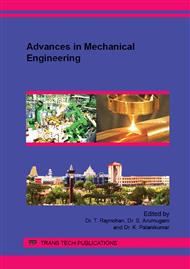p.674
p.679
p.685
p.690
p.695
p.700
p.707
p.713
p.718
Enhancement of Thermo-Oxidative Stability of Vegetable Oil Based Lubricant via Chemical Modification Techniques
Abstract:
The rising demand for environmentally acceptable lubricant has led researchers to look to vegetable oils as an alternative to petroleum based lubricants. Vegetable oils have radically distinctive properties owing to their unique chemical structure which have greater ability to lubricate and have higher biodegradability. In spite of advantages, they are limited to inadequate thermo-oxidative stability and poor low-temperature properties which hinder their utilization. In the present study in order to produce a bio lubricant with good thermo-oxidative stability, rapeseed oil was subjected to two different chemical modification techniques viz., epoxidation method and successive transesterification method. The thermo-oxidative stability of formulated oil was analysed using Thermo Gravimetric Analysis (TGA). TGA analysis divulges that the thermo-oxidative stability of rapeseed oil was greatly improved with the epoxidation method in comparison with the successive transesterification method.
Info:
Periodical:
Pages:
695-699
Citation:
Online since:
November 2015
Price:
Сopyright:
© 2015 Trans Tech Publications Ltd. All Rights Reserved
Share:
Citation:


